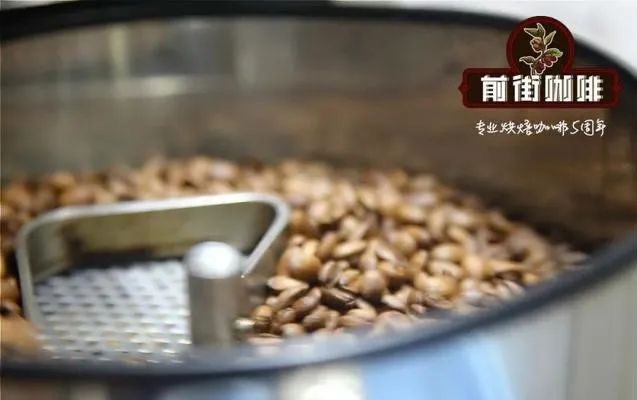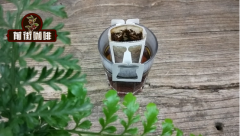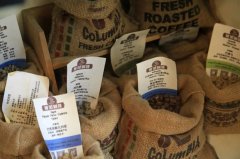The shelf life of coffee beans and the shelf life of fresh coffee beans are very important.

"Fresh" coffee beans?
The "freshness" of ingredients is really nothing to discuss, but it is a bit troublesome to apply to the discussion of coffee beans. The experience of Chamlu barista is that guests are full of misunderstandings or misunderstandings about this problem. If you still think coffee beans are "dry goods" like tea leaves, and you think you can buy them and throw them in the refrigerator for two years, then to paraphrase Mel Gibson's dialogue in the film "Heroes","It's time to make up for it."
Is it called "fresh"? This definition does not apply to coffee beans.
The problem is that the "shelf life" of coffee beans and the "taste period" are too inconsistent. Furthermore, the definition of "taste period" is related to the brewer's control and tolerance of technical errors.
Coffee beans "shelf life" ≠ "taste period"
Generally, the ingredients will be marked with "expiration date", which means that the ingredients will not spoil before this deadline, so please eat them with peace of mind.
Coffee beans are roasted at a high temperature of more than 200 degrees Celsius. If they are packaged immediately after cooling, the chances of bacteria survival are extremely low, so the "spoilage" factor of the ingredients almost does not exist, only the "deterioration" problem of oxidation deterioration. If packaging is done to eliminate oxygen as much as possible (e.g., packaging as flat as possible, or adding oxygen absorbers), the rate of degradation of beans will be extremely slow. From imported goods to local products, it makes sense for coffee beans of all brands to be labeled with a shelf life of six months.
But the problem is that the main reason why coffee is so fragrant is that almost all the aroma substances produced after roasting belong to highly volatile organic compounds. The more fragrant you smell, the more volatile these substances are, and after a certain degree of volatilization, the coffee beans have no taste. Do not believe in an experiment, fresh coffee beans have just been ground to smell, a slight spicy feeling in the strong fragrance; put 10 minutes to come back to smell, only soft and soft light fragrance, with 10 minutes ago, the majestic power is different if two "beans."
We usually drink coffee not for health, but for good taste. Therefore, although the roasted coffee beans have not exceeded the shelf life, we are more concerned about the length of the "taste period" that still retains enough flavor.
To put it in perspective, coffee beans stored at room temperature are assumed to have a flavor drop of about 10% after 10 days and a flavor drop of more than 30% after a month. The next question is, how do we determine the "taste period" based on this curve of flavor decline?
The key to determining the "taste period" is the degree of error in the brewing method:
Most guests lack sophisticated equipment and technology at home: grinding fine powder rate is too high, water temperature control is poor, brewing method is unstable, filling powder is not accurate…, all kinds of uncertain factors caused by extraction results error is roughly not less than 30%. This means that the natural flavor of coffee beans must decline by more than 30% before the taste difference is "obvious" under the brewing of ordinary households. Therefore, Zhan Lu usually recommends that customers who buy beans for their own use set a "taste limit" within one month of the baking date.
The conclusion is that the "shelf life" of coffee beans is limited, but the "taste life" is a relative concept, which exists relative to the brewer's control of brewing variables.
The dilemma of the master brewer:
If you have expertise in brewing and good equipment, congratulations, you can always enjoy a good cup of coffee. Unfortunately, coffee beans have a relatively short "taste period" with your expertise, because it's easy to feel the flavor differences between beans of different roasting dates with your expertise.
Is it luck? Misfortune? It depends on your coffee preferences. However, from the above discussion we can derive the most basic rules of coffee preservation: coffee beans are fresh ingredients, buy the freshest, the sooner the better.
If you still insist on coffee beans as tea leaves,"think" it doesn't matter for a year, or even "think" that it is as fragrant as Pu 'er tea, then give you a suggestion, don't spend too much money to buy beans. Whether it's premium beans or commercial beans, they taste just as bad a month after baking.
Important Notice :
前街咖啡 FrontStreet Coffee has moved to new addredd:
FrontStreet Coffee Address: 315,Donghua East Road,GuangZhou
Tel:020 38364473
- Prev

Coffee leaf rust symptoms robusta coffee bean characteristics what is Arabica
Explanation of the nouns of raw coffee beans (Arabica v.s. Robusta): coffee tree, evergreen tree of Rubiaceae, Rubiaceae has many medicinal plants, such as quinine, Dugan and so on. Most coffee trees on earth are planted in the highlands between the Tropic of Cancer and the Tropic of Cancer, so this area is also known as the "coffee belt". The coffee beans we use to brew coffee are the seeds in the fruit of the coffee tree.
- Next

What are the grades of coffee beans? national standard coffee bean rating standard
Explore the coffee classification system! Teach you to read the label on a coffee bag when we go to a coffee shop to buy a cup of coffee or coffee beans, we always see a series of words, which are interspersed with several initials, such as AA, G1, SHG, etc., which actually means that each country classifies coffee according to its characteristics. It is worth noting that in different producing countries, there will be different habits.
Related
- Beginners will see the "Coffee pull flower" guide!
- What is the difference between ice blog purified milk and ordinary milk coffee?
- Why is the Philippines the largest producer of crops in Liberia?
- For coffee extraction, should the fine powder be retained?
- How does extracted espresso fill pressed powder? How much strength does it take to press the powder?
- How to make jasmine cold extract coffee? Is the jasmine + latte good?
- Will this little toy really make the coffee taste better? How does Lily Drip affect coffee extraction?
- Will the action of slapping the filter cup also affect coffee extraction?
- What's the difference between powder-to-water ratio and powder-to-liquid ratio?
- What is the Ethiopian local species? What does it have to do with Heirloom native species?

